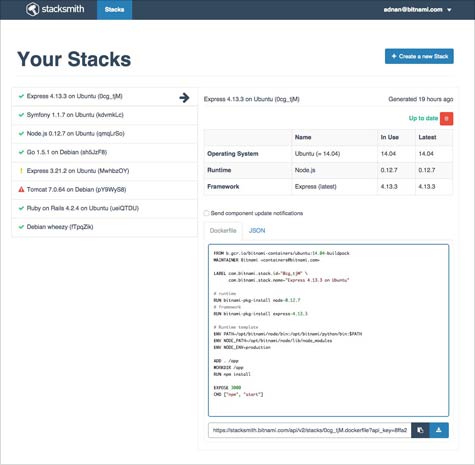Top 10 Strategic Technology Trends for 2016 For all the potential afforded by the rise of Docker containers, IT organizations still need a simple way to turn new and existing applications into a file that will run on top of a Docker container. With that goal in mind, Bitnami today at the DockerCon Europe 2015 […]

Top 10 Strategic Technology Trends for 2016

For all the potential afforded by the rise of Docker containers, IT organizations still need a simple way to turn new and existing applications into a file that will run on top of a Docker container. With that goal in mind, Bitnami today at the DockerCon Europe 2015 conference unfurled a Bitnami Stacksmith service that simplifies not only how Docker images are created, but also updated.
In addition, Bitnami has announced today support for container images using a common language runtime that can be hosted in the Google Container Registry.
Simon Bennett, vice president of products for Bitnami, says Bitnami, which provides a cloud service that developers can use to host components and curate application runtimes, is now applying that same concept to Docker containers. Once an IT organization starts hosting containers on the Bitnami cloud service, Bennett says, via the click of a button they can make use of the Bitnami wizard to package up applications and services inside a Docker container image within a few minutes. Those tools make use of a declarative application programming interface (API) to integrate with trusted container components running on the Bitnami Stacksmith service, says Bennett.
That service not only keeps track of all the dependencies of the components, Bennett says it sends developers alerts any time one of the underlying components on which their application depends is updated.

While commercial developers have taken to Docker containers in droves, Bennett notes that enterprise IT organizations need a simpler way to create Docker images for custom applications that they would like to be able to host in the cloud. To that end, Bitnami not only provides a service to host Docker containers, but also a cloud service where enterprise IT organizations can host those applications that make use of Python, Java, PHP, Go, Ruby and Node.js runtimes.
While most IT organizations are still primarily using Docker containers within the context of the application development process, it’s clear in the months ahead that large numbers of Docker applications will be heading into production environments. In that context, IT organizations will not only be looking for cloud services that make developers happy, but just as importantly, provide IT operations teams with a framework through which all those containers can be managed as much as possible by the developers themselves.
MV
Michael Vizard is a seasoned IT journalist, with nearly 30 years of experience writing and editing about enterprise IT issues. He is a contributor to publications including Programmableweb, IT Business Edge, CIOinsight and UBM Tech. He formerly was editorial director for Ziff-Davis Enterprise, where he launched the company’s custom content division, and has also served as editor in chief for CRN and InfoWorld. He also has held editorial positions at PC Week, Computerworld and Digital Review.








